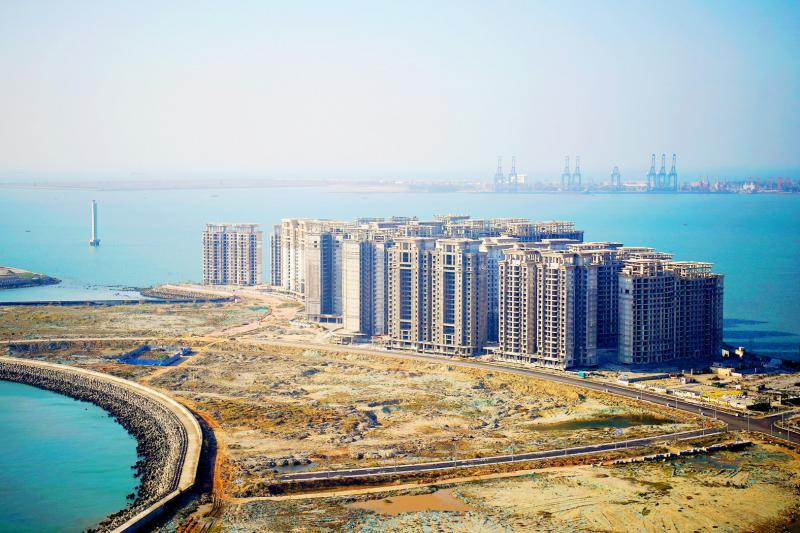Corporate debt defaults and a stretching real-estate bubble have complicated China’s economic outlook, although the risk to Taiwanese markets remains low, the Mainland Affairs Council said in a report published in February.
The report assessing the potential effect of Chinese economic conditions on Taiwan is part of a set of briefings on China and cross-strait affairs commissioned by the council.
Chinese financial markets have since November 2020 been rocked by a wave of debt defaults at state-owned enterprises, wrote lead author Li Chi-keung (李志強), an associate professor at Tamkang University’s Graduate Institute of China Studies.

Photo: Reuters
Available data show at least 143 debt defaults last year totaling 185.45 billion yuan (US$29.14 billion), a 30 percent increase over the previous year and a new record, Li said, adding that the trend is expected to continue this year.
Meanwhile, it remains unknown whether the collapse of troubled developer China Evergrande Group could end a real-estate bubble, the report said.
Evergrande’s 1.9 trillion yuan debt is “only the tip of the real-estate iceberg,” Li said.
As of June last year, developers had collectively amassed debt totaling 32.5 trillion yuan — about 28.4 percent of China’s GDP — of which 960.3 billion yuan is due this year, he said.
Real estate likely accounted for 6.8 percent of China’s GDP last year, Li said.
When the construction industry is included in the figures, the proportion rises to 13.8 percent, and to 29 percent if related services such as sales are included, he said.
Once the bubble bursts, the financial impact would be just as extreme as what occurred after the 2007 subprime mortgage crisis in the US, Li said.
Even if housing prices do not collapse, the depressed market would dampen China’s economic growth this year, challenging its 5.5 percent growth target, he added.
Despite these risks, Li said he does not foresee any major or imminent impact on Taiwan.
A full-scale financial crisis is unlikely in the near term, considering the nature of China’s state-run financial system and strict capital outflow restrictions, he wrote.
China and Taiwan also have relatively independent finances, meaning that a financial collapse in China would have limited direct effects on Taiwanese markets, he said, adding that outstanding debts owed to Taiwanese supply-chain firms pose the greatest challenge.
However, Chinese efforts to mitigate risk might have some effect on Taiwanese firms, Li said.
Beijing is to “deleverage” by tightening lending and monetary policy, further depressing corporate investment, with a domino effect on demand for raw materials and components from Taiwan, he said.
Effects would vary across industries, with steel, concrete and plastics experiencing the most significant losses, he wrote, citing a 21.9 percent decline in steel exports to China and Hong Kong in December last year.
However, demand in the electronics industry remained steady, he added.
In investment terms, production capacity by Taiwanese firms has gradually moved out of China in the wake of the US-China trade dispute and the COVID-19 pandemic, the report said.
Taiwanese firms last year invested US$5.86 billion in China, excluding Hong Kong, a decline of 0.7 percentage points year-on-year, it said.
Considering carbon curbs and electricity restrictions in China, coupled with financial risks and a cooling economy, the downward trend is expected to continue into this year, it added.

The Ministry of Education (MOE) is to launch a new program to encourage international students to stay in Taiwan and explore job opportunities here after graduation, Deputy Minister of Education Yeh Ping-cheng (葉丙成) said on Friday. The government would provide full scholarships for international students to further their studies for two years in Taiwan, so those who want to pursue a master’s degree can consider applying for the program, he said. The fields included are science, technology, engineering, mathematics, semiconductors and finance, Yeh added. The program, called “Intense 2+2,” would also assist international students who completed the two years of further studies in

Former president Tsai Ing-wen (蔡英文) departed for Europe on Friday night, with planned stops in Lithuania and Denmark. Tsai arrived at Taiwan Taoyuan International Airport on Friday night, but did not speak to reporters before departing. Tsai wrote on social media later that the purpose of the trip was to reaffirm the commitment of Taiwanese to working with democratic allies to promote regional security and stability, upholding freedom and democracy, and defending their homeland. She also expressed hope that through joint efforts, Taiwan and Europe would continue to be partners building up economic resilience on the global stage. The former president was to first

Taiwan will now have four additional national holidays after the Legislative Yuan passed an amendment today, which also made Labor Day a national holiday for all sectors. The Chinese Nationalist Party (KMT) and Taiwan People’s Party (TPP) used their majority in the Legislative Yuan to pass the amendment to the Act on Implementing Memorial Days and State Holidays (紀念日及節日實施辦法), which the parties jointly proposed, in its third and final reading today. The legislature passed the bill to amend the act, which is currently enforced administratively, raising it to the legal level. The new legislation recognizes Confucius’ birthday on Sept. 28, the

MORE NEEDED: Recall drives against legislators in Miaoli’s two districts and Hsinchu’s second district were still a few thousand signatures short of the second-stage threshold Campaigners aiming to recall Chinese Nationalist Party (KMT) legislators yesterday said they expect success in 30 out of 35 districts where drives have passed the second-stage threshold, which would mark a record number of recall votes held at once. Hsinchu County recall campaigners yesterday announced that they reached the second-stage threshold in the recall effort against Legislator Lin Szu-ming (林思銘). A total of 26,414 signatures have been gathered over the past two months, surpassing the 10 percent threshold of 23,287 in Hsinchu County’s second electoral district, chief campaigner Hsieh Ting-ting (謝婷婷) said. “Our target is to gather an additional 1,500 signatures to reach